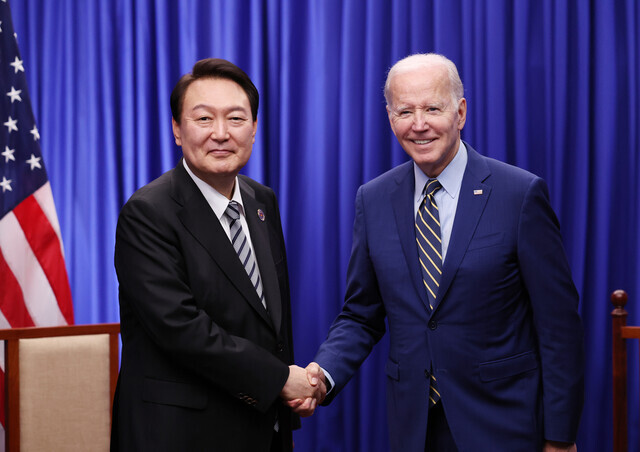hankyoreh
Links to other country sites 다른 나라 사이트 링크
[Editorial] Worrying shows of Yoon’s unilateral diplomacy

Shortly after rushing to patch up relations with Japan with his administration’s plan to resolve the forced labor issue, South Korean President Yoon Suk-yeol announced an upcoming state visit to the US. The Korean presidential office and the White House revealed Wednesday that Yoon will be holding a summit with US President Joe Biden in Washington on April 26. The first state visit to the US by a South Korean president in 12 years coincides with the 70th anniversary of the South Korea-US alliance.
Following his slapdash “solution” to the issue of Koreans forced to work for Japan during the colonial era — a solution that accommodates all of Japan’s demands — Yoon has been accelerating cooperation in all areas both on the bilateral level with the US and on the trilateral level with the US and Japan. Significantly, Yoon’s state visit to the US appears to be giving his administration cover to treat Korean participation in the working group of the Quadrilateral Security Dialogue, or “Quad,” a US-led deliberative body aimed at countering China, as a foregone conclusion.
“We think we’ll have to proactively accelerate our participation in the Quad working group,” a high-ranking Korean official said while explaining the summit agenda.
The Japanese press has also reported that the US government has approached the South Korean and Japanese governments about setting up a deliberative body to bolster cooperation on nuclear deterrence. The three countries are likely to take their military cooperation to the next level.
Both the US and China view Yoon’s actions through the lens of their hegemonic rivalry. Shortly after the Korean government announced its plan for the forced labor issue, the US president and secretary of state both issued statements welcoming the plan, while China’s state-run media warned that the plan was made “due to pressure from the US.”
South Korean participation in Quad under such circumstances will probably elicit even harsher pushback from China.
We’re worried that Yoon’s diplomatic coziness with the US and Japan will force Korea to move in lockstep with the US in sharp negotiations over economic security. The US is pushing through legal provisions that serve its own interest, promising to pay subsidies to companies that build chip factories in America.
There are ongoing fears that even Korean companies with large investments in the US will be exploited to rebuild the US manufacturing sector and that those companies may have to give up factories in China and the Chinese market altogether.
We need to acknowledge the fact that Korean-made electric vehicles were excluded from subsidies under the Inflation Reduction Act last year and that the US has still not come up with a concrete solution to that.
South Korea needs to use its alliance with the US to tackle issues related to security, the economy, supply chain reorganization and industries of the future. At the same time, we must be able to recognize when the US is simply serving its own interests while paying lip service to the alliance. We need to handle negotiations prudently so as to defend our principles and achieve tangible results on our key agendas.
It's worrisome that Yoon’s mad dash to adopt a foreign policy of close ties with Japan and the US is only playing into the US’ strategic needs.
Please direct questions or comments to [english@hani.co.kr]

Editorial・opinion
![[Column] Samsung’s ‘lost decade’ and Lee Jae-yong’s mismatched chopsticks [Column] Samsung’s ‘lost decade’ and Lee Jae-yong’s mismatched chopsticks](https://flexible.img.hani.co.kr/flexible/normal/500/300/imgdb/original/2024/0512/3017154788490114.jpg) [Column] Samsung’s ‘lost decade’ and Lee Jae-yong’s mismatched chopsticks
[Column] Samsung’s ‘lost decade’ and Lee Jae-yong’s mismatched chopsticks![[Correspondent’s column] The real reason the US is worried about Chinese ‘overcapacity’ [Correspondent’s column] The real reason the US is worried about Chinese ‘overcapacity’](https://flexible.img.hani.co.kr/flexible/normal/500/300/imgdb/original/2024/0510/5217153290112576.jpg) [Correspondent’s column] The real reason the US is worried about Chinese ‘overcapacity’
[Correspondent’s column] The real reason the US is worried about Chinese ‘overcapacity’- [Editorial] Yoon’s gesture at communication only highlights his reluctance to change
- [Editorial] Perilous stakes of Trump’s rhetoric around US troop pullout from Korea
- [Guest essay] Preventing Korean Peninsula from becoming front line of new cold war
- [Column] The state is back — but is it in business?
- [Column] Life on our Trisolaris
- [Editorial] Penalties for airing allegations against Korea’s first lady endanger free press
- [Editorial] Yoon must halt procurement of SM-3 interceptor missiles
- [Guest essay] Maybe Korea’s rapid population decline is an opportunity, not a crisis
Most viewed articles
- 1[Column] Samsung’s ‘lost decade’ and Lee Jae-yong’s mismatched chopsticks
- 2Seoul’s plan to adopt SM-3 missiles is like wanting a sledgehammer to catch a fly
- 3‘We must say no’: Seoul defense chief on Korean, USFK involvement in hypothetical Taiwan crisis
- 4Yoon rejects calls for special counsel probes into Marine’s death, first lady in long-awaited presse
- 5S. Korean arrested and detained in Russia under espionage charges for first time in history, Moscow
- 6Korea poised to overtake Taiwan as world’s No. 2 chip producer by 2032
- 7[Book review] Who said Asians can’t make some good trouble?
- 8S. Korea “monitoring developments” after report of secret Chinese police station in Seoul
- 9Yoon voices ‘trust’ in Japanese counterpart, says alliance with US won’t change
- 10[Correspondent’s column] The real reason the US is worried about Chinese ‘overcapacity’